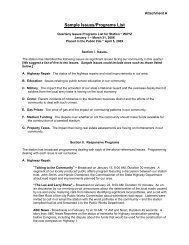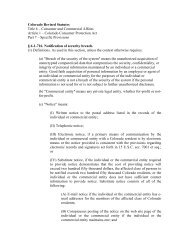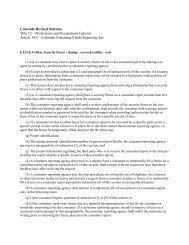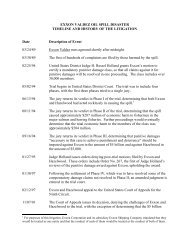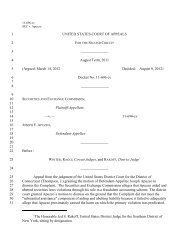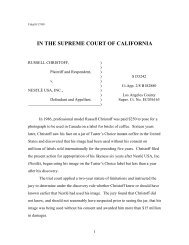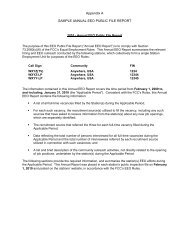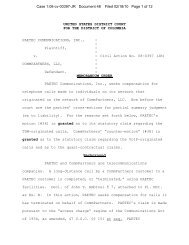QUANTA SERVICES INC, QUANTA SERVICES MANAGEMENT ...
QUANTA SERVICES INC, QUANTA SERVICES MANAGEMENT ...
QUANTA SERVICES INC, QUANTA SERVICES MANAGEMENT ...
You also want an ePaper? Increase the reach of your titles
YUMPU automatically turns print PDFs into web optimized ePapers that Google loves.
<strong>QUANTA</strong> <strong>SERVICES</strong>, <strong>INC</strong>. AND SUBSIDIARIES<br />
NOTES TO CONSOLIDATED FINANCIAL STATEMENTS—(Continued)<br />
price and non-fixed price installation contracts. Pricing under these contracts may be competitive unit price, costplus/hourly<br />
(or time and materials basis) or fixed price (or lump sum basis), and the final terms and prices of<br />
these contracts are frequently negotiated with the customer. Under unit-based contracts, the utilization of an<br />
output-based measurement is appropriate for revenue recognition. Under these contracts, Quanta recognizes<br />
revenue as units are completed based on pricing established between Quanta and the customer for each unit of<br />
delivery, which best reflects the pattern in which the obligation to the customer is fulfilled. Under cost-plus/<br />
hourly and time and materials type contracts, Quanta recognizes revenue on an input basis, as labor hours are<br />
incurred and services are performed.<br />
Revenues from fixed price contracts are recognized using the percentage-of-completion method, measured<br />
by the percentage of costs incurred to date to total estimated costs for each contract. These contracts provide for a<br />
fixed amount of revenues for the entire project. Such contracts provide that the customer accept completion of<br />
progress to date and compensate Quanta for services rendered, which may be measured in terms of units<br />
installed, hours expended or some other measure of progress. Contract costs include all direct materials, labor<br />
and subcontract costs and those indirect costs related to contract performance, such as indirect labor, supplies,<br />
tools, repairs and depreciation costs. Much of the materials associated with Quanta’s work are owner-furnished<br />
and are therefore not included in contract revenues and costs. The cost estimation process is based on the<br />
professional knowledge and experience of Quanta’s engineers, project managers and financial professionals.<br />
Changes in job performance, job conditions and final contract settlements are factors that influence<br />
management’s assessment of total contract value and the total estimated costs to complete those contracts and<br />
therefore Quanta’s profit recognition. Changes in these factors may result in revisions to costs and income, and<br />
their effects are recognized in the period in which the revisions are determined. Provisions for losses on<br />
uncompleted contracts are made in the period in which such losses are determined to be probable and the amount<br />
can be reasonably estimated.<br />
Quanta may incur costs subject to change orders, whether approved or unapproved by the customer, and/or<br />
claims related to certain contracts. Quanta determines the probability that such costs will be recovered based<br />
upon evidence such as past practices with the customer, specific discussions or preliminary negotiations with the<br />
customer or verbal approvals. Quanta treats items as a cost of contract performance in the period incurred if it is<br />
not probable that the costs will be recovered or will recognize revenue if it is probable that the contract price will<br />
be adjusted and can be reliably estimated. As of December 31, 2011 and 2010, Quanta had approximately $77.3<br />
million and $83.1 million of change orders and/or claims that had been included as contract price adjustments on<br />
certain contracts which were in the process of being negotiated in the normal course of business.<br />
The current asset “Costs and estimated earnings in excess of billings on uncompleted contracts” represents<br />
revenues recognized in excess of amounts billed for fixed price contracts. The current liability “Billings in excess<br />
of costs and estimated earnings on uncompleted contracts” represents billings in excess of revenues recognized<br />
for fixed price contracts.<br />
88




